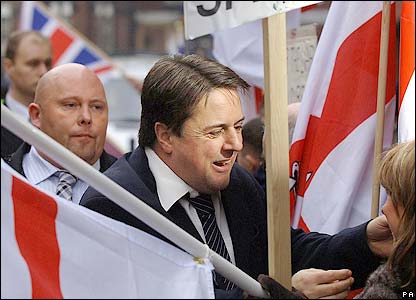 By Damian Talbot / @blackburnlabour
By Damian Talbot / @blackburnlabour
Seven years has passed since that grim day when the BNP won a seat on Blackburn with Darwen Borough Council, representing Blackburn’s Mill Hill ward. As joint election agent, I remember clearly the night of 21 November 2002.
In the week prior to the by-election we could see that the vote was turning away from us. Building on their successes in Burnley earlier in the year, the BNP were looking to other areas vulnerable to infection with their hatred. As a result, the entire national resources of the British National Party were moved to Mill Hill, with Nick Griffin himself involved in on the ground co-ordination.
With BNP activists descending on my community from across the country, the party still enlisted paid help from locals in a strategy designed to saturate the ward with leaflets. On an eve of poll delivery, we saw a young mother — not older than 20 — out in the dark with her toddler son. When we asked her why she was delivering the leaflets she replied coyly that she had been paid to put them out.
The countless, cold hours dedicated to leafleting and canvassing by Labour colleagues from across the borough (and beyond) were not enough as Labour finished a heartbreaking 16 votes behind the BNP. As the significance of the loss set in, even our major improvement in standing, leapfrogging the Liberal Democrats whose resignation triggered the by-election, was no comfort.
With Jack Straw as MP it was national news that the BNP had won a seat in his constituency. How could this have happened?
Seven years hence, it’s almost easy to see how they grabbed the seat. The massive attention given to the party after its successes in Burnley, where divided communities were told that one group was being favoured over another, turned the heads of many disengaged voters across the East Lancashire cotton towns and other post-industrial areas.
Despite the massive Labour investment in towns, like Blackburn and Burnley, neglected by the Conservatives, poverty still remained. Serving up easy blame on the doorstep, whether in 1930s brown shirts or 21st century suits, Fascists will always find their scapegoat.
Though it seemed intuitive to us that the BNP were not the answer to divisions in today’s society, the shock of that day provided the impetus to communicate more effectively and we became more strategic in our campaigning. The hard work paid off. In 2004 the BNP had high expectations in Blackburn with Darwen, fielding 10 candidates. Not one was elected and Evans lost his seat, receiving a little over 130 votes.
Though not without its share of problems, the area where I grew up and now represent as a councillor is ultimately one with a strong sense of community and residents who care about its future. It is by playing to these strengths that we turned things around. The voters of Mill Hill ward soon lost patience with their BNP representative. A ‘pavement politics’ approach can ensure the voters of the North West and Yorkshire & The Humber will soon tire of theirs.
Â




More from LabourList
Letters to the Editor – week ending 14th September 2025
‘A new Business Secretary must mean a new deal for steel’
What will members be considering as they vote for deputy leader?